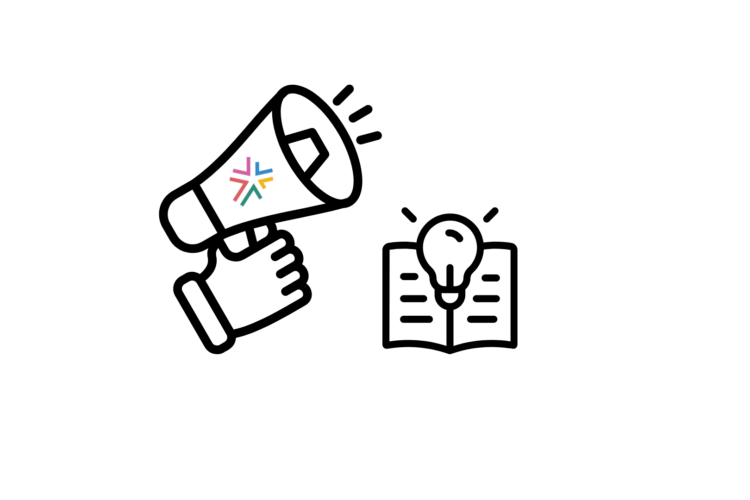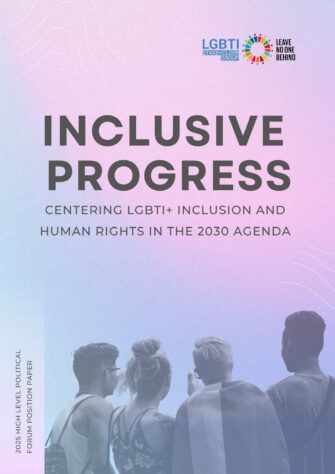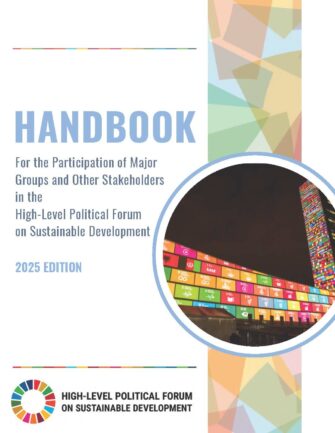The High-Level Political Forum on Sustainable Development (HLPF) is the UN’s main platform for reviewing progress on the Sustainable Development Goals (SDGs), which took place from 14 July to 23 July 2025, under the auspices of the Economic and Social Council.
You can also take part in this advocacy process. You just need to know how. For that reason, GATE compiled a summary of key advocacy learnings for trans and gender diverse communities that wish to have a more active role in advocating for change on SDGs at national, regional and international levels.
What we learned at HLPF?
1. “Queer” the SDGs as a matter of LGBTIQ+ inclusion
If you are not aware of, note that the current SDG goals and targets do not explicitly address LGBTIQ+ issues, so it is essential for Civil Society Organizations and activists to identify entry points for advocacy to ensure that LGBTIQ+ communities are not left behind in national and global development agendas.
Best Chitsanupong, GATE’s Human Rights Officer, joined LGBTIQ+ advocates at workshop held during the High-Level Political Forum on Sustainable Development. Several sessions focused on the importance of “queering” the Sustainable Development Goals (SDGs) by connecting LGBTIQ+ local realities to the global development framework.
In an attempt to include LGBTIQ+ realities into SDG’s development framework, the LGBTI Stakeholder Group’s 2025 Position Paper provided key recommendations to the SDGs being reviewed during the HLPF 2025.
In this paper you will find a clear position: LGBTI inclusion is not optional, it’s essential to achieving sustainable development.
You will also find a comprehensive analysis of SDG 3: Good Health and Well-being, SDG 5: Gender Equality, SDG 8: Decent Work and Economic Growth, SDG 14: Life Below Water, and SDG 17: Partnerships for the Goals, showing where LGBTI people are being left behind, and how to fix it.
At the end of the position paper you’ll find concrete recommendations for LGBTIQ+ inclusion in the SDG’s.
Why this position paper matters for trans communities?
If you’re part of a trans-led community group, NGO, or social movement, this paper gives you the tools to advocate, organize, and speak up in national and international spaces on LGBTIQ+ inclusion to the SDGs.
This is not something only diplomats can push for. In your home country you can use these resources to push for national and regional trans and gender diverse inclusion on health, employment, gender equality, climate, partnerships and many other areas.
2. Build strategic allies at the UN
Besides the Independent Expert on Sexual Orientation and Gender Identity (IESOGI), did you know that there is a global group working to center LGBTIQ+ voices at the UN? It’s called the LGBTI Stakeholder Group and they are pushing governments to act on their promises with LGBTIQ+ communities.
The LGBTI SG is one of several Major Groups and Other Stakeholders (MGoS) that inform and shape the 2030 Agenda for Sustainable Development, adopted by the UN in 2015.
They work with LGBTIQ+ supportive permanent mission of countries such as Spain, Chile, Sweden, Australia and many more to speak up for us at key moments, such as the annual HLPF, where governments share their progress.
Why it matters for trans communities?
Connecting and partnering with the LGBTI Stakeholder Group helps trans and gender diverse communities voices to reach rooms that often silence them. Reaching out to the group and provide input on the lived realities of our communities can only mean more visibility, stronger policies and protections.
Learn how to get involved: www.lgbtistakeholdergroup.com
3. Get involved with the High-Level Political Forum
The HLPF is the central UN platform for reviewing progress on the 2030 Agenda. It is where global leaders address if the SDGs are getting on track or not.
It is also where civil society organizations, including GATE, can engage meaningfully. This year, civil society organizations can take advantage of the newly launched Handbook for the Participation of Major Groups and Other Stakeholders (MGoS).
What is this handbook and who is it for?
This handbook provides best practices, lessons learned, and step-by-step guidance on how to get involved in national, regional, and global decision-making levels, especially at the High-Level Political Forum at the United Nations. So, who is this handbook for?
- Activists, community leaders, and organizations who want to engage in Sustainable Development Goals advocacy.
- Member States, UN bodies, and donors who need to understand why community voices matter and how to engage respectfully.
What the handbook helps you do?
- Understand your rights and role as part of civil society in the UN space.
- Learn when and how you can speak, organize, submit reports, and shape decisions at national, regional, and global levels.
- Access key processes, such as the Voluntary National Reviews (VNRs), where countries report on their SDG progress, and where you can demand your own country accountability.
You can learn more about the Handbook for the Participation of Major Groups and Other Stakeholders now.
4. Use the Voluntary National Reviews (VNRs) to push for change at national level
VNRs are voluntary reviews conducted by countries to assess and present their progress on the SDGs at the HLPF. They are a recurring opportunity for civil society to demand the commitment from member states to ensure no one is left behind on SDG implementation at the national level.
How to engage in VNRs?
- Prepare your evidence in advance, produce a Spotlight Report highlighting your country findings and build alliances with supportive missions. Learn more about your country’s engagement and reports: VNR resources
- Review Spotlight Reports from member organizations of the LGBTI Stakeholder Group engaging with Voluntary National Reviews (VNRs) to see how LGBTIQ+ inclusion is being advanced at the national level.
Marginalized communities like us are the backbone of multilateralism and the SDGs. We have championed intersectionality and prioritized human dignity over mere data. By 2030, the SDGs cannot be achieved if trans and gender diverse communities are left behind. – Best Chitsanupong, GATE’s Human Rights Officer







